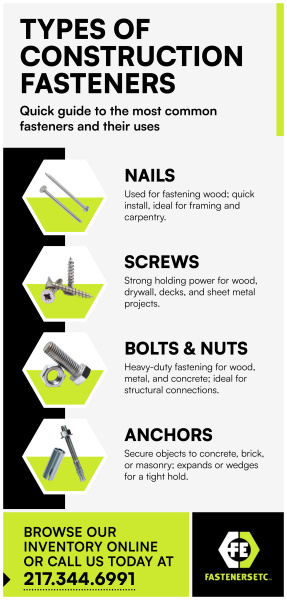Types of Construction Fasteners
Guide to Construction Fasteners: Types, Applications, and Selection Tips
Construction fasteners play a vital role in every project, large or small. These small pieces of hardware are essential for secure and durable connections, ensuring that buildings, bridges, decks, and countless other structures hold together safely and stand the test of time.
At Fasteners Etc., Inc., we understand how crucial the right fastener is for any project. With decades of experience and deep product knowledge, we help contractors, builders, and DIYers select fasteners that fit their specific requirements. From common nails and screws to specialized anchors and high-strength bolts, the world of construction fasteners is broad and versatile.
In this guide, we’ll walk through the types of construction fasteners, their applications, tips for choosing the right one, and the importance of proper installation and maintenance. Whether you’re managing a large-scale commercial project or a smaller residential build, the right fasteners make all the difference.
What Are Construction Fasteners?
Construction fasteners are hardware designed to hold materials together in building projects. While they may appear simple, they are critical to structural stability, safety, and durability. From framing homes to anchoring steel beams or securing decking boards, fasteners provide the reliable connections that every project depends on.
Key things you should know about construction fasteners include:
- Durability: High-quality fasteners are made from strong materials like stainless steel or high-strength alloy steel. Many also feature corrosion-resistant coatings to withstand harsh environments and extreme weather conditions.
- Applications: Fasteners are essential in every construction phase, whether you’re working with wood, metal, or concrete.
- Structural integrity: Without the right fastener, even the best materials may not hold up or perform well. The right fastener choice ensures long-lasting strength and stability.
Types of Construction Fasteners
When it comes to fasteners, there’s no one-size-fits-all. Different projects require different solutions, and each type of fastener offers unique strengths to your project.
Nails
Nails are among the most common traditional fasteners, especially for wood-based construction. They are quick to install, making them ideal for tasks that require speed and efficiency.
Common types of nails include:
- Box nails: These are lightweight and typically used for softer woods or light-duty applications.
- Framing nails: These are heavier and stronger and designed for securing structural wood components.
- Brad nails: These have thin, flat heads and a discreet, low-profile design, perfect for finishing work like trim or molding.
Nails are ideal when you need speed and ease. However, they offer less holding power compared to screws or bolts.
Screws
Screws provide stronger holding power than nails and are designed for precision and durability. Some of the most widely used types of screw include:
- Wood screws:These are designed for securely fastening wood, from framing to cabinetry.
- Drywall screws:These are used for attaching drywall to studs or joists. Their sharp tips and thread design make installation simple.
- Deck screws:Coated to resist corrosion, these are built to withstand outdoor weathering.
- Self-drilling screws: These are ideal for sheet metal and similar materials, as you don’t need to pre-drill holes.
Screws are best for projects that require an extra-strong, long-lasting hold but may need to be adjusted.
Bolts and Nuts
When strength is the top priority for your construction project, bolts paired with nuts provide extra durability. Common types of bolts include the following:
- Lag bolts:These are heavy-duty fasteners for wood that are often paired with flat washers for added stability.
- Carriage bolts:These secure wood-to-wood or wood-to-metal connections and have smooth, rounded heads for a clean finish.
- Anchor bolts:These are designed to fasten components to concrete and are common in structural work.
- High-strength Structural Bolts: Engineered for demanding construction projects where sturdiness is essential, these bolts usually require structural grade nuts to ensure safety and adjustability.
Bolts and nuts are essential for heavy-duty applications and structural components.
Anchors
Anchors provide secure fastening in concrete, masonry, or other solid surfaces. They are crucial for projects that require stability and use heavy materials. There are a variety of anchors to choose from, such as:
- Screw anchors:These screw anchors embed into masonry or concrete for a tight, lasting hold.
- Sleeve anchors:These anchors expand as they’re installed, locking securely into place.
- Wedge anchors:These are common in concrete and masonry. They offer a very secure grip and are ideal for structural applications, including horizontal and vertical installations.

How to Choose the Right Fastener for Your Construction Project
With so many options, how do you select the right connector for your specific project? It comes down to understanding the materials, the environment, and your project demands.
Material Considerations
What a fastener is made of impacts how well it performs and holds up. For example, stainless steel offers strong resistance to corrosion, which is ideal for outdoor or marine environments. Likewise, high-strength steel is best for heavy-duty applications where the structure must be load-bearing.
If your structure is in an environment where there is lots of moisture, chemicals, or salty air, corrosion-resistant fasteners are essential. Choose a fastener with a galvanized coating or specialty finish to provide extra protection in these harsh conditions.
Fastener Types Based on Project Needs
Different projects require specific fasteners.
- Drywall screws are best for interior drywall projects.
- Concrete fasteners are needed for securing into concrete, brick, or masonry.
- Wood screws are the go-to for framing and wood structures.
- Deck screws are designed to withstand outdoor weather and protect decking materials from damage.
At Fasteners Etc., Inc., we guide our customers to the right type of fastener by asking what materials they’re fastening and what type of environment they’re building in. Asking yourself those two questions can help you quickly narrow down the right option.
Key Considerations
In addition to the material and type of project, you should also keep in mind the following when choosing the right fastener:
- Weight of materials: Heavier materials require stronger fasteners.
- Environmental conditions: Exposure to water, salt, or chemicals increases the need for corrosion-resistant materials
- Ease of installation: Some projects may require pre-drilling, specialized tools, or power tools. Choosing the right fastener can simplify installation and save time.
Installation Tips for Construction Fasteners
Even the best fasteners can fail if they are not installed correctly. Proper installation is the difference between a connection that lasts for years and one that fails prematurely. When installing a fastener, use these best practices to help ensure safety, stability, and longevity:
- Match the tool to the fastener: Using the correct drill bits, drivers, or wrenches ensures the fastener seats properly without stripping threads or damaging materials.
- Pre-drill when necessary: For harder materials like dense wood or metal, pre-drilling can prevent splitting and make installation smoother.
- Use power tools wisely: Power tools save time, but they can also strip fasteners if not used carefully. Adjust torque settings and apply steady pressure to ensure a secure connection.
- Consider lubricant: Applying a light lubricant to heavy-duty bolts or screws can reduce friction, extend tool life, and prevent stripping.
Your safety matters to us! Always wear gloves, safety glasses, and other protective gear when handling fasteners and power tools. Follow manufacturer instructions for torque levels, spacing, and proper installation.
Improper installation can lead to project failures and safety risks. However, when installed correctly, fasteners provide stronger joints, improve overall safety, and reduce the need for costly rework.
Maintenance and Inspection of Construction Fasteners
Even the strongest fasteners may require maintenance over time. Regular checks and maintenance help ensure that your structure remains strong and secure for years. After you complete the project, you should do the following to help make sure it lasts:
- Routine checks: Schedule periodic inspections, especially in environments with high moisture, salt, or chemical exposure. Look for signs of rust or corrosion, cracks or fractures, and loosened connections.
- Replacement: If a fastener shows visible damage, replace it right away. Waiting too long can compromise the structural integrity.
- Corrosion prevention: Choosing stainless steel or coated fasteners at the start of a project is one of the best ways to minimize maintenance needs. For existing installations, protective sealants or paints can help shield fasteners from harsh conditions.
Here’s a pro tip: Many contractors make fastener inspection part of their seasonal maintenance checklist, especially for outdoor structures like decks, railings, or roofing systems. Catching a small issue early can prevent far bigger and more expensive repairs down the road.
Fasteners Etc., Inc. is Your Trusted Supplier of High-Quality Construction Fasteners
Choosing the right construction fastener is about safety, stability, and a successful project. That’s why having a knowledgeable supplier makes all the difference.
At Fasteners Etc., Inc., we provide a wide selection of fasteners, from self-drilling screws to wedge anchors and stainless-steel washers, along with personalized service. Our team listens, asks questions, and recommends the best solutions for your needs.
As a veteran-owned business, we understand the importance of reliable and efficient service. When you order from us, you’ll get what you need when you need it. Our expertise is built on our decades of experience in the industry. Over the last 30 years, we’ve grown into a trusted provider of a vast assortment of fasteners and additional hardware for use across all industries.
Whether you’re a large contractor managing commercial builds or a small business tackling residential projects, we’re here to help. You can count on us for trusted advice, quality products, and efficient solutions that make your job easier.
Ready to find the right construction fastener for your project? Contact us today to request a quote or for expert guidance, so you can build with confidence.


